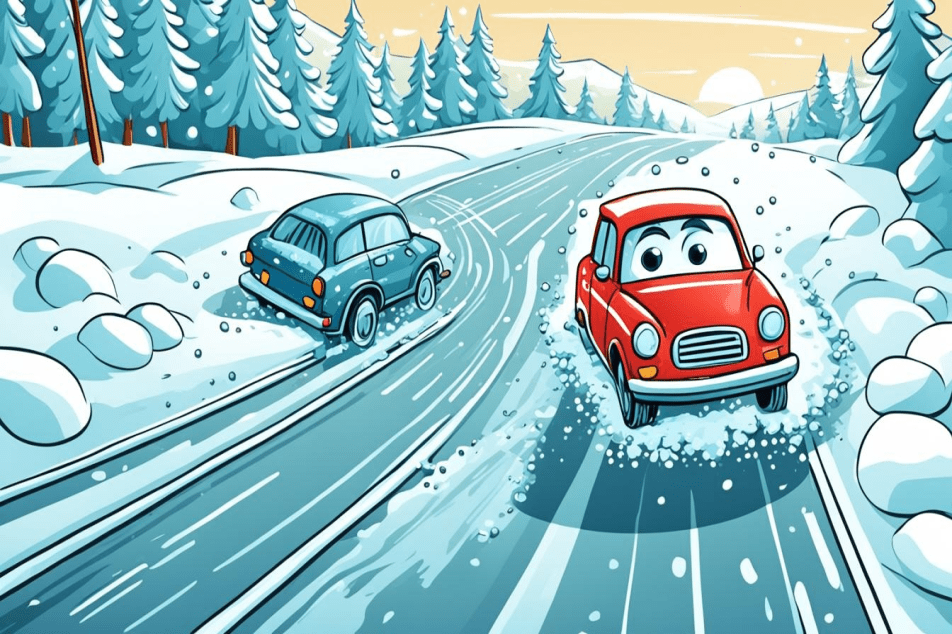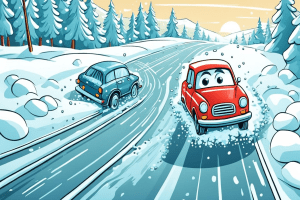
Whether you're embarking on holiday travel or navigating daily commutes, the key to maintaining safety on the streets is recognizing that road conditions shift with each page of the calendar. Our seasonal driving tips provide essential year-round driving guidance to prepare you for the array of challenges each season unfurls on the tarmac.
From the icy grips of winter to the sweltering trails of summer, mastering weather-related driving tips ensures not just your safety, but also the well-being of fellow travelers. Empower your journey with safe driving techniques tailored to weather patterns and seasonal anomalies.
As festive lights herald the coming holidays, let our holiday travel tips illuminate the path to joyous and secure reunions. Drive through the year informed, prepared, and confident that you are equipped with the wisdom to handle Mother Nature's moods behind the wheel.
Spring Driving Tips and Maintenance

With the arrival of spring, the open road calls to drivers looking for new adventures. Yet, this season also ushers in specific driving challenges that necessitate heightened awareness and vehicle readiness.
Anticipate Increased Pedestrian and Cyclist Traffic
Warmer weather brings more people outdoors. Expect to share the road with an increased number of pedestrians, cyclists, and motorcyclists. Exercise caution, particularly in urban areas, school zones, and parks, places where foot traffic is common. Remember to give cyclists adequate space when passing and be vigilant at crosswalks and intersections.
Prepare for Potholes and Changing Road Conditions
The aftermath of winter often leaves roads littered with potholes and unpredictable conditions. Continuously scan the road ahead for these hazards, and maintain your vehicle's tires to handle sudden jolts. Your suspension will thank you for avoiding potholes, but if they're unavoidable, slow down safely before making contact.
Stay Alert for Animals on the Move
Spring is a time of activity for wildlife as well, and animals may unexpectedly dart across the roadway. Be especially alert during dawn and dusk when animal movements peak. If you spot wildlife near the road, reduce your speed and be prepared to stop if necessary.
Maintain Visibility During Unexpected Rain
Sudden spring showers can quickly reduce visibility, making it essential to have windshield wipers in good condition. Ensure your wiper blades are effective and your defroster is functioning properly to maintain clear sightlines. Also, keep your headlights on and use them wisely to improve visibility both for yourself and other drivers.
Seasonal Car Care: Post-Winter Maintenance Checklist
To keep your vehicle performing reliably after a harsh winter, a thorough maintenance check is pivotal. Here's a checklist to ensure your vehicle transitions smoothly into spring:
| Checklist Item | Description | Importance |
|---|---|---|
| Tire Inspection | Check tire pressure and look for wear. Adjust pressures to manufacturer specifications. | Essential for grip and fuel economy. |
| Fluid Levels | Top up or change oil, transmission fluid, coolant, brake fluid, and windshield washer fluid. | Vital for vehicle function and protection. |
| Belts and Hoses | Inspect for cracking or wear. Replace if signs of degradation are evident. | Prevents breakdowns and component failure. |
| Brake Check | Brakes should be responsive and free of wear. Pad thickness and rotor surface should be inspected. | Crucial for safety in varied spring conditions. |
| Battery Test | Ensure your battery is fully charged and the connections are free of corrosion. | Reliable starting and electronic function. |
Taking these steps will not only grant you peace of mind but also protect you from unforeseen road mishaps. Don't let spring's unpredictable nature catch you by surprise; a well-maintained vehicle is your best defense on the journey ahead.
Summer Road Trip Safety Measures

The key to a memorable journey is ensuring the well-being of all passengers while taking in the sights and sounds of your destinations. From the sizzling pavement to the radiant sky, we'll guide you through critical safety considerations for your summer driving escapades.
Protecting Your Eyes with Appropriate Sunglasses
The beaming summer sun enhances the beauty of the landscapes you traverse, but without proper eye protection, it can also pose significant risks. Quality sunglasses are more than a fashion statement; they are a vital piece of gear, shielding your eyes from intense UV rays and reducing glare that can lead to vision impairment and accidents. When packing for your adventure, ensure you have a pair of sunglasses that block out 100% of UVA and UVB rays for optimum protection.
The Importance of an Emergency Preparedness Kit
Unforeseen events can swiftly turn a joyous trip into a precarious situation. A well-stocked emergency preparedness kit is your first line of defense against unpredictable mishaps. This should include basic survival items such as water, nonperishable food, first aid supplies, a flashlight, and essential tools. Tailor your kit to the specific needs of your trip, taking into account the number of passengers and the terrain you'll be exploring.
Drunk and Distracted Driving: Increased Summer Risks
Summer gatherings often herald good times, yet they also coincide with a rise in drunk and distracted driving incidents. Heightened vigilance is crucial during these months, especially on weekends and holidays. Always assign a designated driver and be aware of other drivers' behaviors on the road. Taking extra care during peak times can be instrumental in preventing accidents and ensuring the safety of everyone.
Vehicle Maintenance: Overheating Prevention
Soaring temperatures can take a toll on your vehicle, with overheating being a common and hazardous issue. To prevent breakdowns and the risk of vehicular heatstroke, especially among vulnerable passengers, regular checks on your vehicle's air conditioning system are imperative. Additionally, monitor fluid levels, tire conditions, and your vehicle's battery and cooling systems.
Vigilance in these areas can lead to a summer road trip that's memorable:
- Regularly check your vehicle's air conditioning performance for comfort and heatstroke prevention.
- Be proactive in replacing worn belts and hoses that can lead to summer breakdowns.
- Keep your battery and charging system in check to avoid being stranded in the heat.
- Ensure tires are properly inflated and have sufficient tread for safe summer travel.
- Maintain optimal levels of engine oil, coolant, and other vital fluids to prevent overheating.
Embarking on a summer road trip can be an adventure of a lifetime. However, the safety of all passengers should always be a top priority. Adhering to these summer road trip tips not only ensures a more enjoyable journey but also a safer one. Happy travels!
Precautions for Safe Driving in Fall

Preparing for fall driving conditions ensures a safe and pleasant experience behind the wheel. To adapt to these changes, drivers should emphasize fall car maintenance, adhere to fall driving precautions, and refine their driving techniques to navigate seasonal road hazards effectively.
Navigating Roads Covered in Leaves
One of the signature features of fall is the blanket of leaves that covers the roads, creating a slippery surface that can be as treacherous as ice. Be aware of the potential for leaves to obscure road markings, potholes, and other hazards. Adequate fall car maintenance includes ensuring your tire tread depth is sufficient to provide the necessary traction on leaf-covered roads.
Low Beam Headlights in Fog
Fog is a common occurrence in fall, significantly reducing visibility. To improve your sightline and alert other drivers to your presence, utilize low beam headlights. High beams can reflect off the fog and further impair visibility, making low beams the safer choice. Remember to adjust your driving speed to the conditions and increase your following distance accordingly for enhanced fall driving safety.
Children and Halloween: Extra Vigilance on the Road
The festive spirit of Halloween can quickly take a dire turn without proper precautions. Children excitedly trick-or-treating can often forget road safety, so it's crucial for drivers to be extra vigilant, especially in residential areas. Slow down, anticipate the unexpected, and always be ready to stop quickly to avoid mishaps on the road during this spirited holiday.
Deer Activity and Roadway Safety
During fall, deer and other wildlife are more active, which increases the risk of vehicle-animal collisions. Be especially alert at dawn and dusk when deer are most active. Keep an eye out for deer-crossing signs and use your high beams when there's no oncoming traffic to spot wildlife more easily. If a deer is spotted, slow down and be prepared to stop as they often travel in groups.
Taking these driving precautions not only keeps you safe but also contributes to a more enjoyable autumn experience on the road:
- Inspect and replace worn wiper blades to maintain visibility during rain and foggy weather.
- Check tire pressure frequently as cooler temperatures can cause it to fluctuate.
- Ensure all vehicle lights are working properly for maximum visibility and communication with other drivers.
- Review the owner's manual for recommended fall car maintenance specific to your vehicle model.
- Consider having your car serviced by a professional mechanic to identify any issues that might be exacerbated by cooler temperatures.
To enhance your awareness and readiness for driving in fall, ensure your vehicle is up-to-date with essential maintenance. Regularly checking your lights, brakes, and tire pressure is a part of essential fall car maintenance that should not be overlooked.
Seasonal Driving Tips: Winter Weather Advisory

As the winter months cloak the roads in snow and ice, safe winter driving becomes a pivotal concern for motorists. Armed with the right winter driving advice and an understanding of safe driving in winter conditions, you can navigate even the chilliest routes with confidence. Preparing your vehicle and adapting your driving habits to the season's demands are the cornerstones of ensuring a safe journey from start to finish.
Installation and Use of Tire Chains
If your path is lined with snow or glacial surfaces, installing tire chains can be a literal life-saver. These traction devices provide the much-needed grip to keep your vehicle steady on icy roads. However, it's essential to familiarize yourself with the installation process before you find yourself in the midst of a winter wonderland.
Regular checks on your automobile's antifreeze levels, battery health, and brakes will complement the security offered by tire chains, fostering impeccable vehicle performance in cold weather.
Verify Weather and Road Conditions Pre-Departure
Being forewarned is being forearmed, especially when it comes to winter travel. Always verify the weather forecast and road conditions before setting out. This information can be crucial in deciding whether to postpone your journey or take additional precautions. Road services often provide updates on route conditions and potential closures, helping you plan a safer trip. Remember, informed driving is safe driving.
Essential Items for a Winter Emergency Kit
In the event that you become stranded, a winter emergency kit stocked with essentials can make a critical difference.
Your driving kit should include items like the following:
- blankets
- a flashlight
- non-perishable food
- water
- a shovel
- a charger for your cellphone
This kit is not just about survival; it's about comfort and staying in touch during unexpected delays. Make sure to place this kit in your vehicle as a standard component of your winter gear.
Safe Driving Techniques on Icy Roads
One of the hallmarks of safe driving in winter conditions is the ability to navigate icy roads. This entails increasing your follow distance, moderating speed, and making smooth steering and braking actions to avoid skids.
Be especially vigilante on bridges, overpasses, and rarely-traveled roads, where ice tends to form first. Employing these driving techniques will increase your control over the vehicle and help prevent accidents.
Anticipating and Responding to Skids
Skidding on ice can be a harrowing experience, but staying calm can help regain control of your vehicle. If you feel your tires lose grip, ease off the accelerator or brakes, and steer gently in the direction you wish to go.
Abrupt movements can exacerbate the skid, so smooth, deliberate actions are paramount. Anticipate the potential for skids by observing the road ahead and adjusting your driving accordingly.
Winter weather presents an array of challenges, but with prudent preparation and a robust grasp of safe winter driving practices, you can reach your destination without incident.
Keep these winter driving tips in mind as you make your travel plans, and enjoy the beauty of the season safely and responsibly.
How do you adapt your driving habits to ensure road safety during different seasons?








